
Last week, President Joe Biden issued an executive order containing 72 new government mandates designed to spur competition in the American economy.
The Biden EO gives a blueprint for agencies to target leading American industries with crippling new regulations. Instead of encouraging competition, this EO will kill competition by allowing Biden bureaucrats to reshape the economy in service of their liberal social goals.
One of the EO’s stated goals is to address the supposed rise of monopolization in the American economy. While the left claims that market concentration is snuffing out competition, the data shows that our economy remains extraordinarily competitive. This EO is a solution in search of a problem.
According to Census data compiled by the Information Technology and Innovation Foundation, only 4 percent of U.S. industries are highly concentrated, and the share of low-concentrated industries grew by 25 percent from 2002 to 2017. Industries with low levels of concentration were responsible for 80 percent of business output in 2017.
The EO contains several antitrust provisions that would force American companies into a “Mother-May-I” relationship with the federal government.
One provision would increase government scrutiny of routine mergers and acquisitions. The EO hones in on so-called “killer acquisitions” made by technology companies, alleging that dominant firms are strangling small startups in the cradle to avoid competition.
This misguided view ignores that M+A activity is a massive driver of economic growth and innovation. While technology companies have engaged in hundreds of acquisitions in recent years, only a few deals have come under scrutiny. American tech companies lead the world in R&D spending, not the behavior you’d expect from a monopolist unafraid of robust competition.
Acquisitions allow larger firms to quickly deliver innovative new products to consumers because they have the scale and infrastructure to do so. More than half of all startups say that their most realistic long-term goal is to be acquired by a larger firm, providing a key incentive for entrepreneurs to assume the risk that comes with starting a new company. M+A activity ultimately benefits all Americans with lower prices and greater access to innovative products and services.
The EO also targets “self-preferencing,” where platform companies promote their own private-label products next to name-brand products in their marketplaces. This is not a business practice endemic to the tech industry. Brick-and-mortar retailers promote generic goods on shelves next to brand-name goods, or with promotional devices like coupons, end-caps, and window displays.
Banning platform companies from promoting their private-label goods would take away products and services that consumers value. Given that generic products are usually cheaper than brand-name goods, such a ban would raise the cost of basic household items for American families. Prohibiting Amazon from selling AmazonBasics products is about as ludicrous as banning Costco from selling their popular Kirkland products.
To implement the ban on self-preferencing, the Biden EO calls on the Federal Trade Commission to establish new rules banning “unfair methods of competition on internet marketplaces.” This is curious timing given that the Democrat-controlled FTC just voted to rescind bipartisan limits on its UMC authority.
Ultimately, the competition EO is window dressing. None of its recommendations have the force of law, but the EO does reveal a few things.
First, the left is engaged in a full-court, government-wide press to weaponize antitrust law in service of progressive social goals. The antitrust recommendations in this EO closely mirror the sloppy antitrust package the House Judiciary Committee marked up last month. Senator Amy Klobuchar (D-Minn.) is working on Senate companion bills to the HJC package and has an antitrust package of her own. Newly-anointed FTC Chair Lina Khan has already smashed bipartisan norms in her first few weeks on the job, and will certainly work overtime to expand her agency’s power to promulgate and enforce new antitrust policy at any cost.
Second, the left’s antitrust plan will destroy the consumer welfare standard that has undergirded antitrust law for over four decades. Under the consumer welfare standard, antitrust enforcers only act against companies that are harming consumers through tangible effects like higher prices, lack of output, or reduced quality or innovation. The standard prevents unelected bureaucrats or judges from weaponizing antitrust law and disregarding consumer harm to advance unrelated social goals, precisely why the left wants to destroy it.
Third, the left’s antitrust plan goes way beyond Big Tech. The EO hits industries of all stripes, including finance, pharmaceuticals, agriculture, meat processors, real estate, alcohol manufacturers, railroads, and airlines.
If the left succeeds, American companies in every industry will lose their competitive edge both in the United States and abroad. Companies fearful of abusive antitrust litigation will pull their punches when competing with rival firms, robbing us of the robust competition that delivers the best choices and lowest prices for all Americans. Reverting to a European-style competition policy would deliver Europe’s low levels of innovation and economic growth. The heavy hand of government will crush successful companies with costly regulations, which historically has driven whole industries (like railroads and airlines) to the brink of extinction.
Ultimately, the Biden EO is the wrong approach to competition policy as we grapple with runaway inflation and an economy still trying to recover from the pandemic-induced recession. If the ideas in the competition EO were implemented, policymakers would kill competition in the name of saving it.

